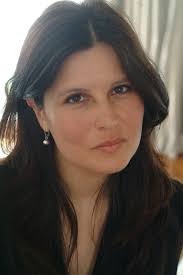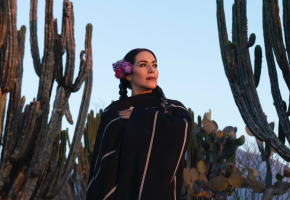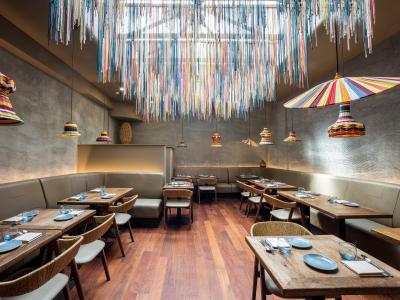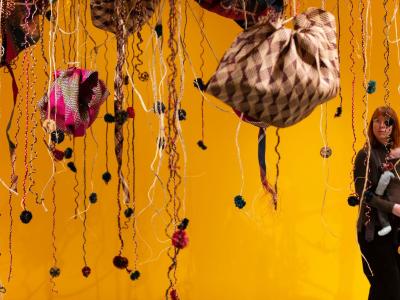
Bolivia Clasica
Making her professional debut aged eight years old, a Gold Record aged eleven, and performing at the White House aged twelve, pianist Ana-Maria Vera has remained devoted to chamber music ever since, performing across the globe with major artists such as Ivry Gitlis, Joshua Bell and Steven Isserlis. A descendant of Bolivia’s Andean Aymara civilisation on her father’s side, her career and education meant Ana-Maria grew up in the U.S. and Europe. Nonetheless, Ana-Maria has always had a special connection to Bolivia, and felt frustrated that her country – the poorest in South America – is unjustly overlooked despite its enormous cultural potential. In 2011 she took a leap to change this, and started Bolivia Clásica.
Image

The aim of Bolivia Clásica is to bridge the cultural gap between Bolivia and the rest of the world. Holding concerts in locations from the mountains of La Paz to the Uyuni salt desert, Bolivia Clásica’s festivals showcase Bolivia’s diverse and breathtaking landscape, and put Bolivia on the classical music map. The second arm of the organisation is a year-round music academy including a string quartet program, a children’s choir and a youth chamber orchestra. The foundation delivers a superior musical education to a new generation of Bolivians by flying in the best classical musicians from around the world to train children (mostly from disadvantaged backgrounds) and local teachers, as well as providing the children with quality instruments.
Explaining the benefits of classical music to a child’s development, Ana-Maria describes its meditative, soulful qualities, on the one hand, and on the other, the need for discipline and a precise, mathematical way of thinking. Talking to Ana Maria about Bolivia Clásica, it seems that her attitude to music, whether consciously or not, is reflected in her personality. She is completely in love with her country, relates to it on a spiritual level, and transmits that passion to others. Yet she is also very pragmatic and detail-oriented in her approach to the organisation’s work, and completely committed to ensuring that it is effective, sustainable, and long-lasting. This duality is perhaps what has made her so successful with Bolivia Clásica. At a London concert in March to launch the 2014 festival, held in conjunction with Bolivia’s Ambassador Roberto Calzadilla, musicians spoke about their personal experiences of Bolivia with real excitement and affection, and a clear desire to enthuse their audience about the project.
Latino Life: At the festival launch, I was struck by the enthusiasm of performers about their experiences in Bólivia. How do you go about recruiting?
I didn’t really have to recruit from very far – I’ve been performing for 40 years, playing with some really wonderful musicians. Over the years they’ve heard me talk about Bolivia, it’s always been very close to my heart. In fact, they inspired me to go and organise something so that they could come initially, in 2000. There’s never been a shortage of wonderful artists who would like to go, it’s just that Bolivia is not on the international circuit – it gets passed over even when they do international or South American tours; it’s often Argentina, Brazil, maybe Chile or Colombia. It’s just such a waste of an opportunity – not just for Bolivia, but for the artists themselves because it’s a really special place. So for the first festival in 2011 I was talking to my friends and colleagues and tried to see who was free and when, and work around them initially. But as the word spreads and they come back and tell their friends, there’s just more and more musicians who come forward themselves to participate.
LL: Was it always clear you wanted to bring musicians to Bolivia, rather than take the students abroad?
Whenever I used to go to Bolivia that was the only option for talented kids in Bolivia, to leave. I used to get approached a lot for help but I never felt I was in a particularly good position to do so, since I don’t teach at a school. Though I am looking at all these options for the ones who still need to do that, because it is important for some to go and study abroad. But [in starting the foundation] I thought, “How much more impactful would it be for musicians to go there?” It became more and more apparent that education is key, and that to leave a mark we’d have to bring people for longer periods of time, and work with more and more kids, and that would have more of an effect. We’re still in that process now: although we started the school two years ago and we’ve had a lot of musicians come out, they usually can stay no more than two months at a time – and that’s actually quite a long time for a professional musician to stay in one place, especially somewhere as far away as Bolivia. Having said that, many of those who have been want to go back and spend more time. It’s been life changing in some cases.
LL: Is there an aspect of teacher training involved?
The musicians I brought initially for the festivals are performers like myself rather than teachers per se – a lot of them teach, have positions at Royal Academy or wherever, but certainly they don’t specialise in teaching children at the beginner or intermediate stages. But that’s an issue we’re addressing now: I’m researching and talking to people, trying to see how we can bring someone in to do teacher training. Actually not just to teach the kids but the local musicians and teachers to empower them and give them the training they need to really teach beginners. That’s a really special skill. You have to know how to give them tools and lay the foundation, but almost more important is to have a way with kids. That’s where we’re headed.
LL: How did the initial trip come about that started it all, back in 2000? What was the journey between that and starting Bolivia Clásica ten years later?
I was living in Paris at the time, celebrating the millennium with some Israeli musicians. Bolivia is quite a popular destination for young Israelis, and they had heard from their friends about it, and told me I should organise something so they could go there, because they’d love to go and no one ever invites musicians out there. And I thought: “Ok, I’m going to do this”. I had never done anything remotely like it; I just show up at a performance, perform and leave, I didn’t have any idea what went on behind the scenes. So that was a real challenge, I had to raise all the money…luckily I had my brother living out there to help organise it, and an artist friend. We went to the salt desert (Salar de Uyuni), and various places of amazing natural beauty, just to show them around - places I’d never actually been. It became a really interesting tour unlike anyone had ever done, visiting little tiny youth orchestras where my brother had been teaching. So six months later we were sitting in the salt desert, having been flown there by our friends, travelled to the remotest places imaginable with our instruments. It left such a mark, not just on me but on them, and on Bolivia too somehow – that that was even possible to do. But then life took over, years went by. It had always been in the back of my mind to do something more structured and long-term. We’d been living here in London with my daughter who’s seven now. My husband, who fell in love with Bolivia too when he went there the first time, said he’d love to go, why don’t we spend time there. It never occurred to me that we could live there until he said he wanted to – because of our careers, it’s just not practical. It opened up this possibility in my mind. My daughter was very young, and I realised that the time to do something crazy like that was now. At one point something shifted in our agenda so we had some time with no obligations – we just looked at each other and said let’s do this. So two months later we had rented out our house, packed everything we could and moved there.
LL: So after 10 years, it was that quick…
Yes, but the timing had to be right. It’s so easy for your agenda to fill up – concerts, school… I remember our friends in the neighbourhood said “you can’t do this, you can’t just pick up and leave London!” It was a gamble in so many ways.
LL: I suppose there’ll never be a ‘right time’ – it has to just be the right time for you.
Exactly- like having a child! And it felt very much like a second child: the same kind of crazy leap of faith, followed by absolute devotion to the vision, and nurturing it and keeping it fed - fundraising is a big part of what I do now, which I had no experience of before. But when you really believe in something, and invest your time and put your money where your mouth is, people do respond.
LL: What have been the particular successes so far?
When I go there and see the music students showing up and making music together and seeing how it’s affected their everyday lives, and probably their futures. It’s still early days, but nothing is more beautiful than seeing that eagerness, and the interaction between my colleagues and those kids.
LL: People you’d never expect to even meet…
Yes, throwing them together and seeing how that dynamic affects both sides. And then, just the simple level of the music making, it’s just exploded in just two years and with so little resources. We’ve really put our attention on quality: we bring the best people we can, the best instruments we can under the circumstances – not usually expensive, but they’re well selected. Having hair on violin bows for example, and strings that can produce a sound. It’s largely ignorance than holds back progress in general, and it’s the same with music. You have knowledge, experience, and you inject that into a project. It’s like fertilising a plant; it’s really satisfying. When I go and see that school happening in front of me I feel so proud, and slightly disbelieving: did I have anything to do with this? I’m still feeling very inexperienced – I’m learning all the time: it’s also about how to manage people, empower them and delegate and not be a control freak… We have some very inspired key local professionals, and they’re the ones that make that machine work.
LL: Is local involvement an important aspect? It seems that some organisations, with the best intentions, don’t get it right because they don’t have consider that.
That was something I was very wary of when we arrived – although I’m Bolivian, so I’m not an outsider exactly, but I was still aware of that. My brother’s been there 20 years so he’s really working from the inside. But yes, with a lot of good intentions after a couple of years there’s no evidence of that work. And I was being guided by the kids themselves: their testimonials, their frustrations, what could be done to improve things. We’ve seen and heard stories from the kids about projects that have started out well, with a lot of enthusiasm and created excitement and hope, and it all goes terribly wrong: because they don’t know what they’re doing, or they’re doing it for the wrong reasons. And who pays the price? It’s always the kids. So they were understandably guarded – in a way they didn’t want to invest too much, though they were exited. But they were very candid, that they hoped this time it’d be different.
LL: What sort of things did they want to be different?
They wanted people who could actually bring knowledge, conocimiento, that they could learn something from. All they want is to improve themselves. They work hard, they’re not lazy; but teachers there are very limited. The [music] level tends to be mediocre, but the younger generation, maybe because they have YouTube and the like, they see that things can be better than what is immediately around them. So they dream, and we’re trying to give them that. I think this [Bolivia Clásica] is the first time they’ve stood in front of musicians who can really play their instruments, who really have something to say about the music from a deep place, because it comes from a long line of proper teaching.
Proper teaching is hard to define, but ultimately what we want to do is – and what my teacher gave me – is to find my own voice and to teach someone how to teach themselves. But with children you also have to give them very clear structures. You learn so much doing it too: to have young people who are so eager to learn, not just because their parents have made them, because it actually changes their sense of who they are in a deep way - that’s very exciting for any musician, to feel that what they have to offer is so valuable…. Whereas here in London we’re saturated by the best of everything – so you don’t feel that your presence [as a teacher] is as significant.
LL: What kind of knowledge or understanding do they have of classical music in Bolivia? Is Bolivia Clásica often their first introduction?
It’s a largely indigenous population, and folk music is a big part of the culture – it’s very rich and beautiful. But the folk music is actually already a hybrid, the Spanish/European influence has been there for over 500 years. The Spanish occupation brought so many things with it: language, religion, ideas, architecture – and music. And music is universal. So it’s quite astonishing to see how responsive the audiences are in a place like Bolivia that you might not associate them with classical Western music. To me they’re the best audiences anywhere, they’re so open and so responsive.
Lately there’ve been a lot of social programmes in Bolivia inspired by El Sistema in Venezuela, that provided an introduction to classical music for a lot of kids who wouldn’t have known it before. But the response is something that’s in them. Many of the kids have told us this story: they hear classical music for the first time in these programmes and they just want to learn. It’s like the Pied Piper – “Where can I learn to play?” – and you give them a violin…but sadly that’s where some of the problems begin with some of these programmes – the bows have practically no hair, the strings so old that they hardly make a sound; that doesn’t stop them, but it’s very frustrating after a while for kids with musical ability. And the teachers themselves are students teaching what they learned themselves five minutes ago. They don’t bring teachers from abroad for these programmes, they just find whoever they can who knows more than the next. It becomes quite sad; it’s a great thing what they’re doing, but what we’re trying to do is help rescue the ones who really want to continue with music and who could become future teachers of these programmes. To re-inject quality. We’re still trying to figure out how we can be more effective and create a trickle-down pyramid effect. In fact we’re having meeting tomorrow with the Bolivian Ministry of Education because they’re really interested in having our quality teachers and teacher training potential injected into the fiscal schools system, which is really ambitious - it all comes down to how much money they can put into it, because the sky’s the limit really. We have people in charge who know what they’re doing. We’re learning as we go, we’re flexible, we have no agenda – we’re doing this because we know we can help, you can see the impact, it’s making a difference.
LL: What do you think it is about classical music specifically that is transformative for these kids?
It’s a language…it’s a discipline, it’s a way of life, it’s a vocation. It’s a wonderful way into the soul and into…meditation. I have friends who rave about meditation and encourage me to try it, but I feel it’s something I’m already doing with music: you spend a lot of time by yourself with the music, and it takes you places… you’re never ever satisfied with how you can interpret a Beethoven sonata, for example - it gives you so many opportunities to explore yourself, that I don’t know - it’s almost a religious vocation, I think, because you can’t possibly be doing it for any other reason than because you have to. Speaking for myself, I was thrust into it so young that I don’t know any other life. But I’ve seen what it can do when you start sharing that with young people , I can see it with my own daughter who I’m teaching. Because there’s always a certain resistance to wanting to work, as a child – but if you teach it the right way music is so rewarding for a child … it instils a discipline that serves you for the rest of your life in whatever you do. You can’t cheat. There are no shortcuts. If you want to learn how to play, you have to learn everything from the theory: the mathematical side of rhythm, what makes a phrase a phrase, how it’s really a dialogue and a conversation, and polyphony... there’s so much involved in music that you start learning as part of something that’s so beautiful spiritual, that it’s a lesson in life, I think. Then to be able to play, whether it’s for pleasure or for an audience, it’s a privilege. You get to know the genius of Bach, of Schumann, because you’re in it – you’re working with it, you live it, it’s something you struggle with and fight with sometimes and fall in love with… it’s a beautiful thing. I know that if you study music it makes you much more prepared to learn other things; it creates some sort of infrastructure in your brain which allows you to capture a lot of other things too. I feel like a lot of the young people will benefit – not because we want them to all become professional musicians , though hopefully some of them will, because that will perpetuate the cycle with music and creating good music schools. They’re very responsive: they love it in a way that I’ve seen few people here are as passionate about.
LL: You didn’t grow up in Bolivia, because of studying and performing classical music abroad from a young age. What was the first time you went to Bolivia?
When I was nine and my grandmother was still alive and she lived in a marketplace in La Paz, in a very old house, and baked bread for the whole neighbourhood in big vats. It was very colourful, so alive with energy and life. I was always happiest there, even as a child – I didn’t understand why - in a place where there was no water, no heat, the usual comforts…but I think everyone feels that way still when they go there. I remember when I took the professional musicians up to Isla del Sol [the Island of the Sun, on Lake Titikaka] we did this little concert there; and the violinist Katharine Gowers looked at me at one point when we were climbing up to our hotel and said: “I didn’t realise you were taking us to heaven”.
LL: Has your relationship with Bolivia changed in doing this project?
I’ve learned so much about Bolivia, but my essential relationship with it hasn’t changed. I did it out of that feeling; I do feel it’s given me a lot - it’s hard to enumerate, if anything it’s just confirmed what I felt.
It’s strangely overlooked. People end up there kind of by accident and say “why have I never heard of this place before? I was just on my way to Argentina or Brazil”… It’s always nice to hear that, as a Bolivian… Although it’s funny, a lot of Bolivians don’t feel that proud of Bolivia. They’re looked down on by the neighbouring countries, and there’s a lot of racism as well, it being a largely indigenous country – they were slaves …all that’s changing, with Evo (Morales). Even the old guard is realising that this country has so much to offer, it’s not just a place to be plundered or passed through. It’s actually a destination place. I mean, I was never happier than when I lived there, or spent holidays there. I could move back any time.
LL: What are your plans and aims moving forward?
I think the teacher training thing will make biggest impact. We just created this foundation in Bolivia - that has been the intention almost from start, but it’s taken almost two years to get there, because of all the bureaucracy - this is happening because we want it to be a long-term project, not just a fly-by-night that can fall apart in a moment. It’s very fragile still but it’s one step in the right direction. And of course the aim is that it’s not just going to be me, but to spread the base of operations to include other people. And to make sure everything is done properly, from accounting to ideas, with transparency, so we can be recognised not just nationally but internationally.
We also want to create exchange programmes with other music schools or institutions that might be interested in sending grad students to either teach or play, and maybe have some kids go here or around the world. Those are the longer-term goals – institutional alliances. Which I think will also have an economic benefit, so we don’t have to carry the financial burden of bringing people over as we have been. I really want to find ways to make it more efficient and sustainable – because there’s no reason why it couldn’t be more sustainable. Classes have been offered free, but even there I’m thinking – well just for those that can, they could pay a tiny amount, to show that they’re serious. Because most of them are, but Bolivia has this tradition of, well, not always showing up on time, things like that – and we need to make sure we set the right tone, so there’s investment from both sides.
LL: I think the traditional models of charity are certainly giving way to that kind of more reciprocal model, in order to foster more equal relationships that are more about exchange than completely top-down charity.
Yes, that is a very unhealthy and disempowering position to take. Certainly Bolivia has suffered for good reason; but attitudes need to change. We did raise most of our funds in Bolivia as soon as I got there, which is pretty unbelievable – in Bolivia there’s no real culture of doing that. I just went in there and started knocking on doors. And I’m the sort of person who can never ask for anything for myself, but found it much easier to do that for the ones that really need it. So I think we broke ground in that sense, we raised 100% of money from the second year on in Bolivia.
LL: And that creates more sense of ownership as well.
Exactly. Having said that, now I’m back in London and we have a charity here there are things to be done here too, obviously. A lot of musicians from Britain are going there, and I’m realising they’re benefiting just as much as the kids, and will be the first to say so. It makes sense to sustain it from this side because it’s doing good on this side as well.
LL: That’s certainly the main message I got from the festival launch concert: that the musicians themselves had gained so much, that travelling to Bolivia and working with the kids had been transformative for them.
I’m so glad that’s what you saw! That’s what I was hoping would come across. At the beginning I wasn’t so focused on that side – I was just thinking “what can I do for my country?” I obviously wanted to show my friends my country, and like I said they inspired me to go in the first place. So there was always an element of that, but it’s much bigger than I thought.
LL: What are the plans for this year’s festival?
We have a wonderful violinist, Jaime Laredo, who’s a huge name in our world. He’s based in the States, and better known there, but he’s Bolivian, and I’ve known him since child. He’s lived abroad almost all his life because of his studies, and hasn’t been to Bolivia for over 30 years. That’s the big attraction for this festival. Even he and I have never played together before, I’m very excited about that alone. When I started this project I thought “we have to think of a way to get Jaime to go back.” I talked to him about it before going, and he wrote me a beautiful letter saying “if you do something, I will come”. That was such a motivating thing. Three years later, he’s coming with his wife, the cellist Sharon Robinson, and son-in-law Paul Watkins, a cellist and conductor who’s a huge star here and internationally. Jaime is an icon in Bolivia, and he’s going to be playing in a stadium named after him that he’s never been to. There’s a whole new generation that doesn’t really know him. He works a lot with kids in New York – he has a very famous string seminar and youth orchestra. And now he’ll be conducting our little youth orchestra in La Paz. Since he’s Bolivian I can’t help but think he’ll be that much more overwhelmed by that experience; his daughter being there for the first time ever, and his son-in-law is as excited as anyone… It’s especially important to get it right this year because we want them to come back! To show them: this is what it can be like and what we can do in this country – it’s come so far. It could have a really big impact.
LL: And what can people here do to help?
I’m actually organising a little package to make it easier for people to travel to the festival with High Life – a travel company run by a Bolivian and based in London, to help promote the festival, and Bolivia. Short of going there, though, people can also support our charity here in UK, and in Bolivia. Donations in forms of instruments have also been given. We desperately need pianos – even one! One concert grand would be amazing. When I go to perform as a pianist it’s very frustrating; once I went to Tarija, this beautiful wine country on the border with Argentina to do a concert; I show up, and they’re so proud and show me a piano – it’s from 1849! A gorgeous Steinway from the museum – gorgeous-looking thing, but it’s two tones down… I mean I did play it, but I can’t invite a pianist to come…. It’s a real issue. For this summer with Jaime we’re really struggling – we’ll have to do some concerts without a piano – but if we could just get one it would make a huge difference, we could travel around with it. So there’s a lot of work to be done. Like a child, it has to grow to survive; it’s all-consuming. But as bumpy as the road’s been, it’s definitely grown.
http://boliviaclasica.com/
http://www.ana-mariavera.com/














